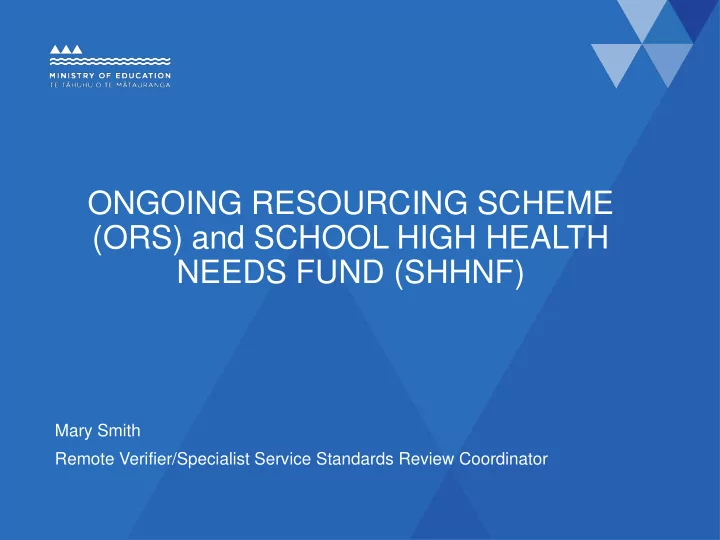

ONGOING RESOURCING SCHEME (ORS) and SCHOOL HIGH HEALTH NEEDS FUND (SHHNF) Mary Smith Remote Verifier/Specialist Service Standards Review Coordinator
ORS • Purpose of the Scheme • Two levels of verification • Focus on need for specialist involvement • Nine criteria • Sources of applications • Must meet one or more of the criteria • Clear evidence for ongoingness throughout school years 2 education.govt.nz
Type of need and matching criteria Need Very High Criteria High Criteria Learning 1 5 Hearing 2.1 6.1 2.2 Vision 2.3 6.2 Physical 3 7 Language use and 4 8 social communication Combined moderate 9 needs 3 education.govt.nz
Decision making process • The verifiers • Independent decisions • Consensus decisions • Panel decisions • Seeking more information • Timeframe for decisions • Notifying applicants 4 education.govt.nz
Requesting a review • Write to Manager Eligibility • Within 6 months of application • Provide additional information • Different independent verifiers • All information considered • Inconsistencies between applications must be explained 5 education.govt.nz
Audit visits Individual audits For more information go to www.education.govt.nz 6 education.govt.nz
Appeals Section 10 Education Act • Parents’ choice and action • Based on existing information provided to verifiers • Independent arbitrator 7 education.govt.nz
Managing the resource • Additional to all other school funding • Ministry of Education, Special Education is the ORS fundholder • Some schools are accredited as Specialist Service Providers 8 education.govt.nz
Completing an application • Read the ORS Guidelines www.education.govt.nz • Decide on criterion/criteria • Work as a team • Download application form • Fill in form electronically • Provide up-to-date information • Summarise specialists’ reports 9 education.govt.nz
Completing an application Tell the verifiers what the student does: • independently • in the classroom • in the playground • in the community • with his peers Tell the verifiers the amount of support the student needs to: • follow instructions • complete tasks 10 education.govt.nz
Completing an application Include information about whether the student: • understands rules • generalises • retains what’s learned • solves problems • uses knowledge functionally • manages personal care and belongings Include information about the student’s learning: • reading levels with comprehension • maths levels • examples/samples of written language 11 education.govt.nz
Frequently asked questions • Is there an ORS quota? • Are diagnoses and labels useful? • What about IQs and other tests? 12 education.govt.nz
High Health Needs Funding** Residential Schools* Ongoing Resourcing Scheme High special education needs Communication Service (3% of school-aged children) Behaviour Service/IWS Resource Teachers: Learning and Behaviour Moderate Physical, Hearing, Vision Services Regional Health Schools Moderate to high special education needs (4% of school-aged children) Special Education Grant Early childhood resourcing Early Intervention Services (5% of children 0-5 years) Assistive Te Aho o te Kura Property Technology School Transport Assistance Pounamu*** Modifications Success for All Positive Behaviour for Learning Every School, Every Child 13 education.govt.nz
School High Health Needs Fund • The School High Health Needs Fund (SHHNF) provides teacher aide time for one-to-one care and supervision so the student can attend school safely • For students who require care and supervision in the medium or long term ie, for more than six weeks. 14 education.govt.nz
Important factors • Many High Health conditions reviewed annually • Age and ability to self mange the condition important • Not for students who require support for less than half an hour a day • Not for helping with learning or catch up of the curriculum 15 education.govt.nz
Criteria for SHHNF • High health need requiring care at school • Care for supervision, physical help, crisis response or administering treatment or intervention • Care essential for student to access school, maintain or improve attendance • Intensity, frequency, duration • Care is to: • preserve life • prevent severe health effects • prevent injury • control infection 16 education.govt.nz
Criteria for SHHNF • Aim is that where possible the resourcing will help the student to be self-managing in the future • Teacher aides time is part of a plan to help child to be independent • Age of child, capability to manage, type of need and procedure taken into account 17 education.govt.nz
Exclusions • Not for helping with curriculum learning needs • Not for catch-up on missed curriculum • Not for care needs taking less than half an hour per day • Not for children funded through ACC • Not for mental health needs • Not for students in ORS 18 education.govt.nz
Decision process • Applications considered by panel of verifiers • Eligibility determined by frequency, intensity and duration of need • Verifiers seek more information from medical specialist, or school if necessary • The school can send additional information to apply for a review if the application is unsuccessful 19 education.govt.nz
Reviews • The eligible letter will state how long the child will be resourced. • Schools send updated information for the review of eligibility on request from Manager Eligibility • Essential to provide good records about the intensity, frequency and duration of the student’s needs 20 education.govt.nz
SHHNF and other special education resources • Students can get SHHNF and any other special education funding, except ORS • If student’s high health needs are as a result of an accident, ACC provides the teacher aide time 21 education.govt.nz
Moderate Health Needs Any condition that needs less than ½ hour per day of 1:1 support e.g. • Stretches • Help with dressing for swimming • Managing infrequent or mild seizures • Infrequent use of nebuliser • Helping with clothing, doors, wiping bottoms for toileting • Monitoring blood sugar levels 22 education.govt.nz
Recommend
More recommend